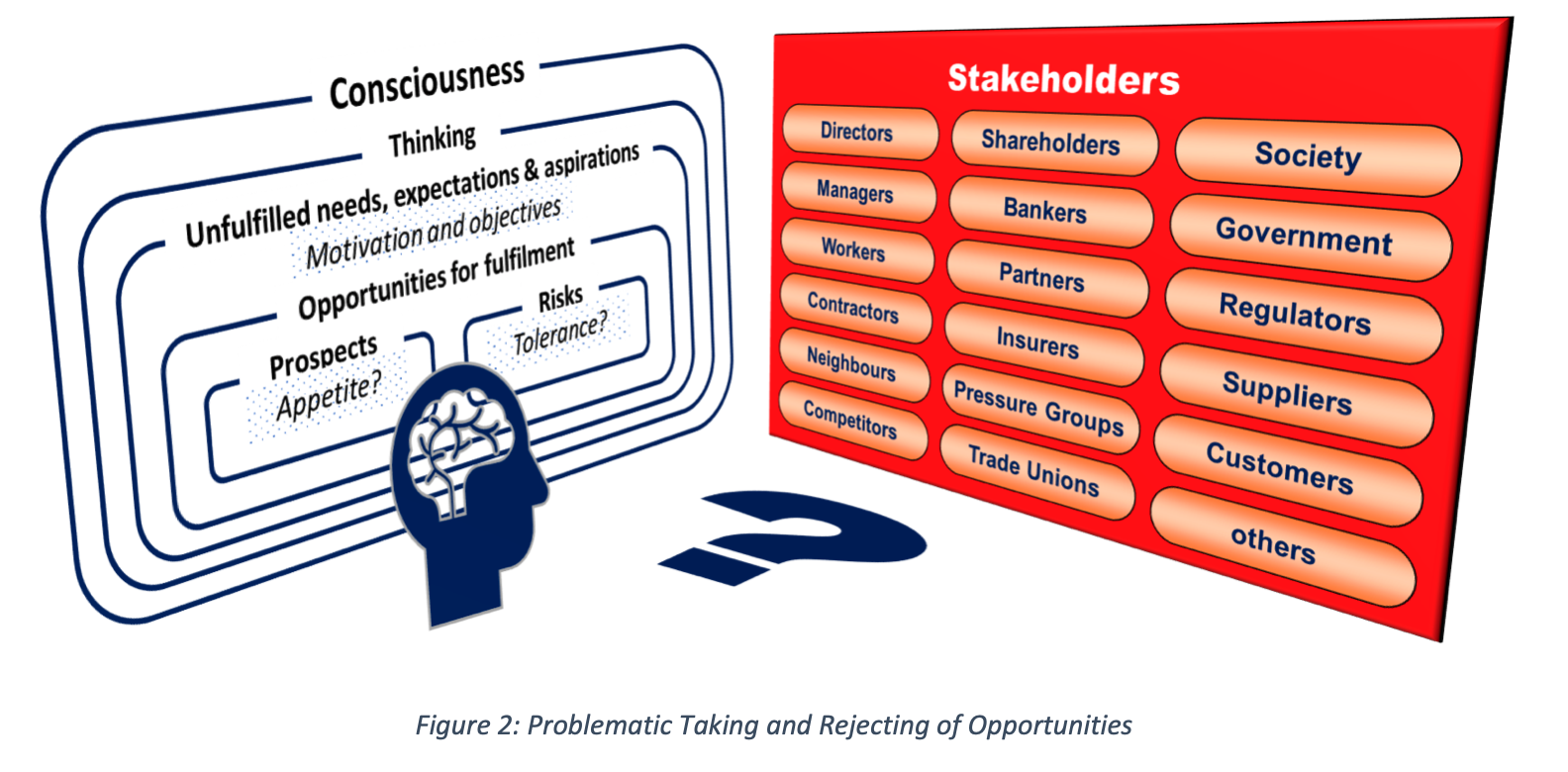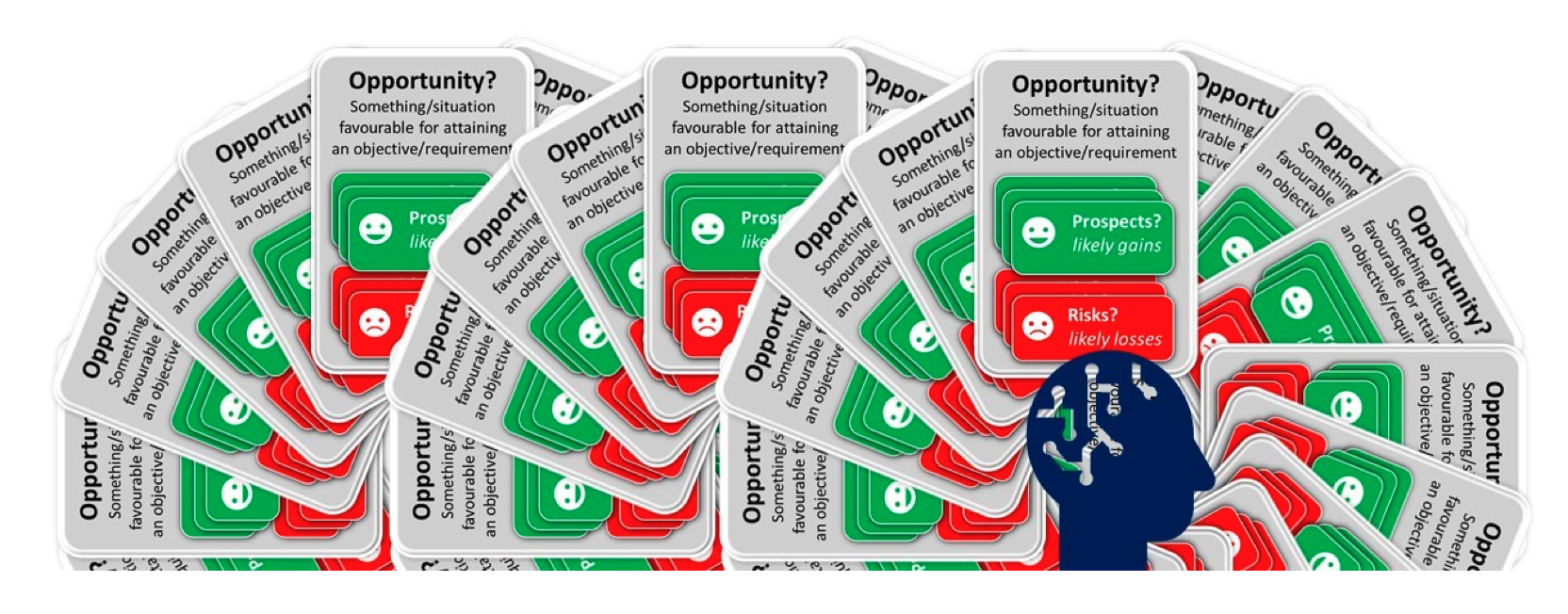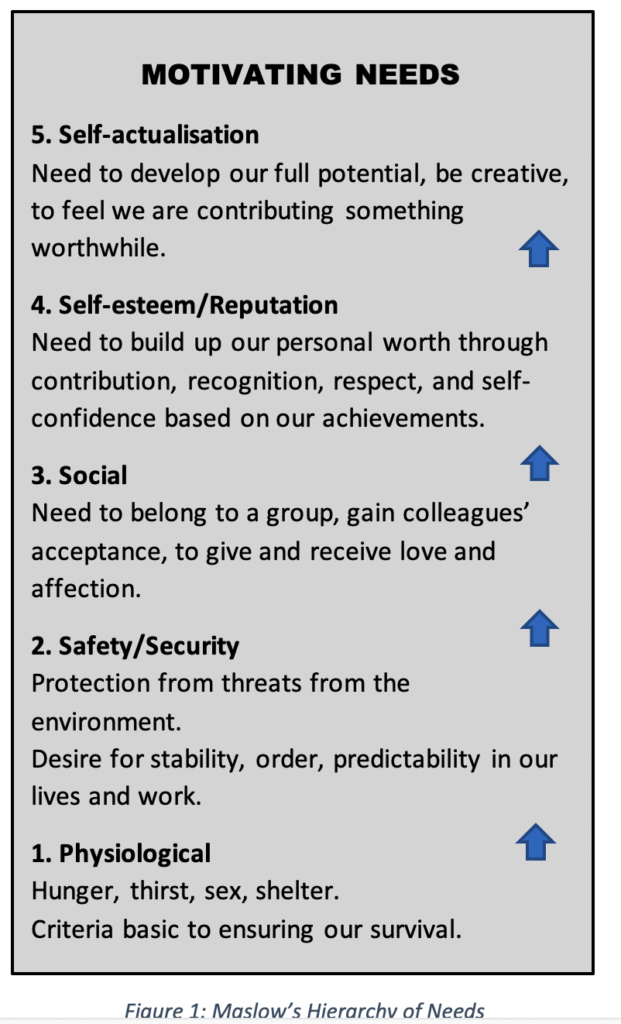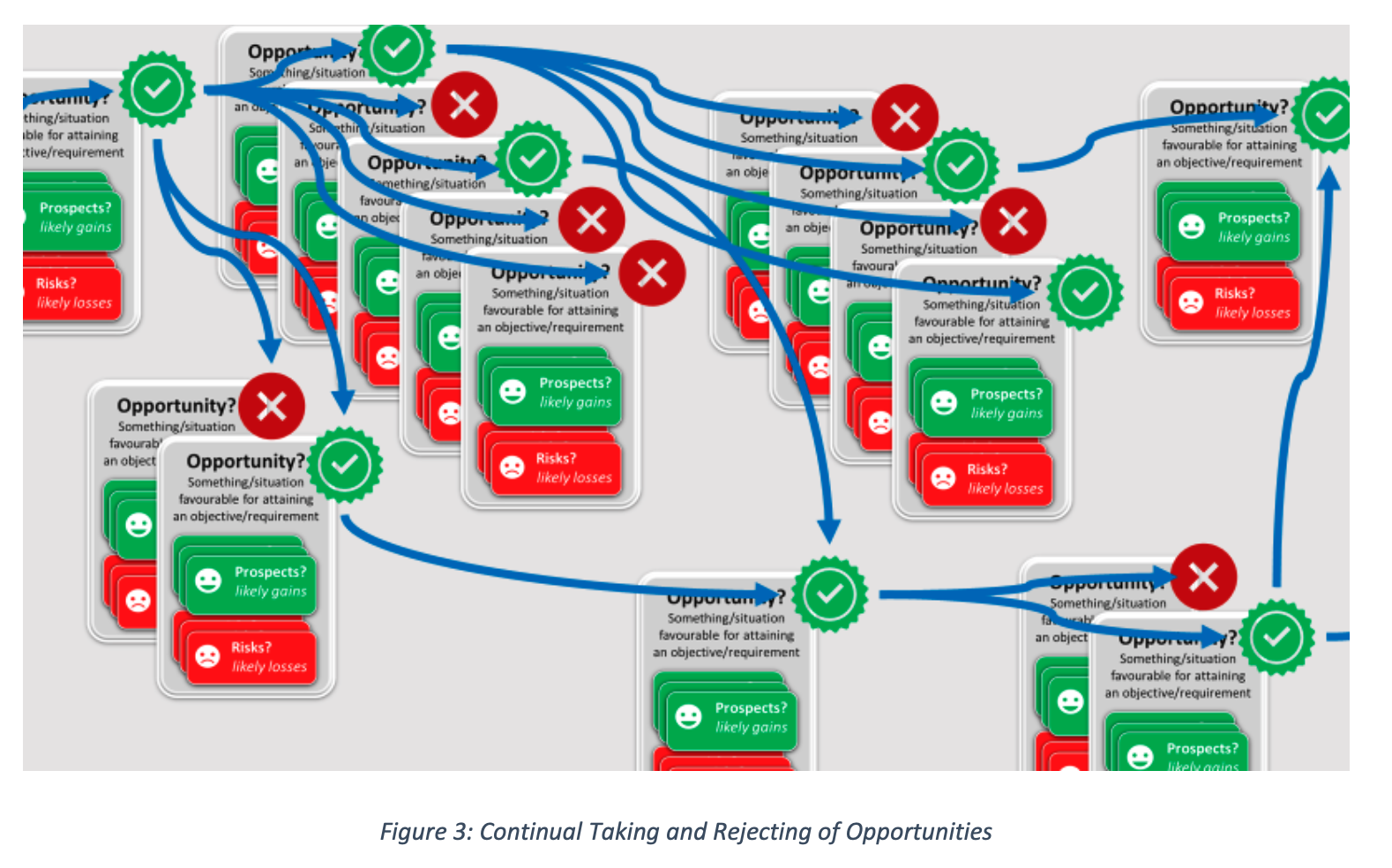- Value creation and value retention emerge from the continual seeking and subsequent taking or rejection of opportunities
- Prospect and risk are critical elements of opportunity
- Taking better opportunities is the key to all types of continual improvement
Other than through natural hazards outside of human control, often referred to as ‘acts of God’, everything that we perceive as good or bad is the result of the continual playing of the ‘Game of Opportunities’. Human behaviour comprises repeated evolutionary cycles of opportunity taking linking past, present and future. It is this seeking, assessment, evaluation, taking and rejecting of opportunities that determines our individual and collective paths through life made possible because humankind is conscious and able to exercise free will. We are addicted to this mind-boggling game where death is the only permanent escape
Humankind are the big hitters of the animal kingdom and the advances in our knowledge has empowered us to play for much higher stakes and to make significant potential positive and negative impacts on the Earth’s resources and ecosystems that sustain us and everything else. This pool of natural resources is the playground in which we have significantly underperformed and created global problems. Even the effect of natural events has often been worsened by the opportunities we have taken. A different future demands we must take more life supporting opportunities. Our understanding of the ‘Game of Opportunities’ must develop and be played sustainably to improve the quality of life for everyone.
A world of opportunists
Whether we are self-serving or otherwise, we are natural opportunists, and are persistently motivated to satisfy our personal needs and those of others, while avoiding or minimising undesirable outcomes. From birth we learn that attempts to fulfil our motivations through the taking of opportunities delivers a variety of fulfilled and undesirable outcomes.
In 1943 Maslow defined a ‘Hierarchy of Needs’ summarised in Figure 1. It demonstrates that our choosing of opportunities is subject to multiple motivations that depend on the degree that they are already satisfied which complicates our motivation. We constantly seek and take opportunities that we believe are right trading off the perceived upsides and downsides.
We are therefore conflicted when confronted by opportunities and choosing between uncertain attractive upsides and repellent downsides. These potentially feed our prospect appetite while impacting our risk tolerance, respectively. Risk is inevitably tolerated because it cannot be disentangled from prospect which is satisfying a need. The net attractiveness of an opportunity is our perception that needs, expectations, and aspirations will be sufficiently satisfied after making all the necessary prospect and risk trade-offs.
Beyond this the playing of the ‘Game of Opportunities’ is made more problematic by:
- Uncertainty of past and present knowledge and data.
- Limitations of our understanding of the laws of nature and their influencing of outcomes.
- Uncertainty of the existence and likely realisation of an opportunity’s prospects and risks.
- The degree that they will satisfy evolving stakeholder needs, expectations, and aspirations.
- Everything being space and time interdependent.
Nature of the game
Along with the rest of humanity, we are constantly identifying, weighing, and choosing what we perceive to be the best or optimal opportunities often necessitating complicated and challenging prospect and risk trade-offs. Even the freedom to continue with the status quo is a legitimate opportunity but not necessarily available to us.
Success depends on the power of our thinking which should be joined-up, coherent and creative. Like management, the ‘Game of Opportunities’ is played and judged on the level of human consciousness.
 According to our ability, we are empowered to take opportunities that shape our and others’ futures – see Figure 2. Heart and mind both influence our play and involving both can create synergistic advantages.
According to our ability, we are empowered to take opportunities that shape our and others’ futures – see Figure 2. Heart and mind both influence our play and involving both can create synergistic advantages.
Invariably, it is a high stakes game played under intense pressure resulting in mental stress and other negative impacts on our wellbeing. Game fitness may also be impaired by fatigue, alcohol and drug abuse, lack of physical and mental fitness and health, and an unfavourable environment.
Conversely, game fitness is improved by integrated thinking, ability to make good intellectual and intuitive judgements, intelligence, creativity, and the ability to work with others. However, it may be negated by personality weaknesses such as impulsiveness, irrational thinking, biases, inability to reason objectively, or a propensity to gamble or having other destructive vices or criminal traits. Competent square pegs in square holes is critically important.
These aspects can influence our prospect appetite and risk tolerance associated with any given opportunity e.g., we may have a large appetite for the prospect of winning the lottery and a medium tolerance for the risk of losing money while engaging in gambling.
Group play
Organisations are created and endure to deliver a purpose via the taking of an initial opportunity facilitating its birth and the subsequent continual taking of opportunities. Whatever their size and type, commercial or otherwise, behaving like super-organisms, organisations play the ‘Game of Opportunities’, and include the most influential, powerful, and largest of multi-national corporates. Top leaders often have ‘Game of Opportunities’ star status, may be headhunted and may command high remuneration. Local, national, and international governments are also principal players acting on behalf of society via political arrangements of varying degrees of integrity and efficacy.
The local and global playing of the game constitutes the observed behaviours of humankind that determine the well-being of the planet and every aspect of it. It is this buzzing human dynamics of motivation that is the essence of human behaviour that an alien would observe first, and conclude was delivering local, national, and global life supporting or harming outcomes. Cause and effect permeates the flowing of the game, and chaos_theory and the butterfly effect explains that every player can potentially impact every other player positively and/or negatively – see Figure 3.
Conclusion
Linking past, present and future, the opportunities continuum defines an interconnected and interdependent tapestry of human endeavour motivated by our needs, expectations, and aspirations. The pixels of the management big picture are opportunities with prospect and risk as their components. Success emerges from seeking and taking opportunities that optimise equitable stakeholder value creation and retention while making the best use of resources. This requires integrated management thinking empowering us to think logically, coherently, creatively, clearly define problems, compare alternatives, make better choices, and negotiate more skilfully and equitably. It is not so much thinking outside of the box but no longer thinking in boxes. This facilitates sustainable equitable stakeholder focused solutions and avoiding lost opportunities and cycles of unintended consequences.
Bio Ian Dalling
Ian Dalling is the Director of ‘Unified Management Solutions’, that specialises in integrated approaches to quality and risk management. He is a Chartered Mechanical and Electrical Engineer, a fellow of the Chartered Quality Institute, a fellow of the International Institute of Safety and Risk Management and holds degrees in engineering and physics. He is a retired management consultant and chair of the Integrated Management Community.
Ian’s career commenced in 1962 working for the Central Electricity Generating Board in various posts within nuclear power plants embracing operations, planning, management services, quality management. In 1989 he moved to the United Kingdom Atomic Energy Authority Safety and Reliability Directorate (SRD) as a risk management analyst and consultant.
His career has spanned the design, construction, commissioning, operation, and decommissioning of conventional and nuclear power plants, as well as providing a wide range of quality/risk management consultancy in other major hazard industries including oil and gas, electrical power distribution, rail, construction and medical devices. He started his own management consultancy in 1999 delivering services for clients in the UK and internationally in Eastern Europe, India, and China for national and international bodies. He chaired the Chartered Quality Institute Integrated Management Special Interest Group from 2007 until 2020 when it was expanded into the Integrated Management Community. Ian led the international team that created the world’s first universal management system standard without boundaries (MSS1000). He has published many integrated management papers and articles.
His roles have included:
- Leading operational planning team during the construction and commissioning of an Advanced Gas Cooled Reactor nuclear power plant.
- European Notified Body Quality Manager certifying machinery and medical devices under European Product Directives.
- Serving on the European Process Safety Committee, and the British Standards steering committee for BS 8800, a guide on the management of occupational health and safety.
- Leading a team assessing the 120-year decommissioning programme for the Winfrith Steam Generating Heavy Water Reactor in the UK.
- Assessing nuclear weapons assembly and maintenance safety culture.
- Developing crisis and emergency plans for a regional electricity company.
- Member of international team that assessed the safety of the Lithuanian Ignalina RBMK nuclear power plant following the Chernobyl accident.
- Providing systems analyst support during the development of safety critical software.
Bio Ian Dalling
Ian Dalling is the Director of ‘Unified Management Solutions’, that specialises in integrated approaches to quality and risk management. He is a Chartered Mechanical and Electrical Engineer, a fellow of the Chartered Quality Institute, a fellow of the International Institute of Safety and Risk Management and holds degrees in engineering and physics. He is a retired management consultant and chair of the Integrated Management Community.
Ian’s career commenced in 1962 working for the Central_Electricity_Generating_Board in various posts within nuclear power plants embracing operations, planning, management services, quality management. In 1989 he moved to the United_Kingdom_Atomic_Energy_Authority Safety and Reliability Directorate (SRD) as a risk management analyst and consultant.
His career has spanned the design, construction, commissioning, operation, and decommissioning of conventional and nuclear power plants, as well as providing a wide range of quality/risk management consultancy in other major hazard industries including oil and gas, electrical power distribution, rail, construction and medical devices. He started his own management consultancy in 1999 delivering services for clients in the UK and internationally in Eastern Europe, India, and China for national and international clients. He chaired the Chartered Quality Institute Integrated Management Special Interest Group from 2007 until 2020 when it was morphed into the Integrated Management Community. Ian led the international team that created the world’s first universal management system standard without boundaries (MSS1000). He has published many integrated management papers and articles.
His roles have included:
- Leading operational planning team during the construction and commissioning of the Dungeness B Advanced Gas Cooled Reactor nuclear power plant.
- European Notified Body Quality Manager certifying machinery and medical devices under European Product Directives.
- Serving on the European Process Safety Centre Committee, and the British Standards steering committee for BS 8800:1996, a guide on the management of occupational health and safety. BS8800 informed OHSAS18001 which informed ISO45001.
- Leading a team assessing the 120-year decommissioning programme for the Winfrith Steam Generating Heavy Water Reactor in the UK.
- Assessing UK nuclear weapons assembly and maintenance safety culture.
- Developing crisis and emergency plans for a regional electricity company.
- Member of international team that assessed the safety of the Lithuanian Ignalina RBMK nuclear power plant following the Chernobyl_disaster.
- Providing systems analyst support during the development of safety critical software.
Publications
Ian Dalling has published many articles on integrated management and the universal management system standard MSS1000 in a range of publications including CERM Risk Insights, the International Institute of Risk Management (IIRSM), the Chartered Quality Institute (CQI), and the International Register of Certified Auditors (IRCA) Journals.
Publishing a book on integrated management is still on Ian ‘s to-do list. The closest to fulfilling this aspiration has been the drafting of the 300 page universal management system standard MSS1000 which he intensely focused on between 2011 and 2014. It was based on a set of mutually consistent unified management principles, concepts and definitions. MSS1000 had been demonstrated to be possible in his article ‘Order from Chaos’ published in the April 2011 edition of Quality World which explained a full scope boundless hierarchical management topic taxonomy. In essence, the taxonomy defined a logical place for everything that can potentially be needed in a management system, standard, regulation, license etc. and was informed by his quality and risk management consultancy experience and the creation of proven full scope boundless integrated management systems created with his clients.
Ian has published the following notable papers on various aspects of integrated management:
- Research into relationships and correlations between plant safety performance and occupational safety performance for British_Energy and BNFL Magnox in conjunction with DNV, 2000.
- Understanding and assessing safety culture, Society for Radiological Protection meeting, Saint Catherine’s College Oxford, 9 April 1997, published in the December 1997 Journal of Radiological Protection. Includes the ‘Dalling Model’ of organisational performance.
- The Future is Unified – a Model for Integrated Management, Quality World, April 2000.
- Integrated Management Definition, CQI Integrated Management SIG, 2002, reissued 2007.
- Eyes and Ears (integrated monitoring), Quality World, April 2004 – subsequently translated and published into Chinese and Japanese in the ‘Global Sources’ journal.
- Integrated Management System Definition and Structuring Guidance, CQI Integrated Management SIG, 2007.
- Order from Chaos (management topic taxonomy), Quality World, April 2011.
- Drafting of Universal Management System Standard MSS1000. 2011-2014.
- Management Integration: Benefits, Challenges and Solutions, International Institute of Risk and Safety Management (IIRSM) Technical Paper, March 2012.
- Managing Data in an Evolving World – A guide for good data governance, International Institute of Risk and Safety Management (IIRSM) Technical Paper, August 2016.
- Using MSS 1000 to Boost Performance, CQI Integrated Management, October 2016.



